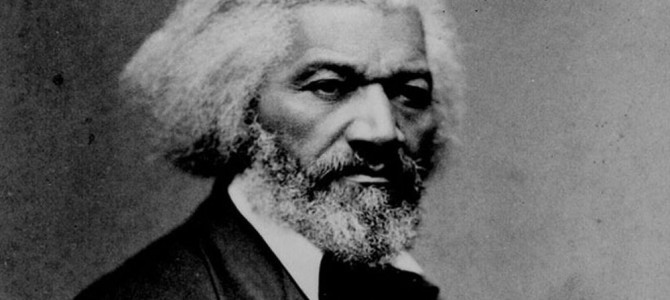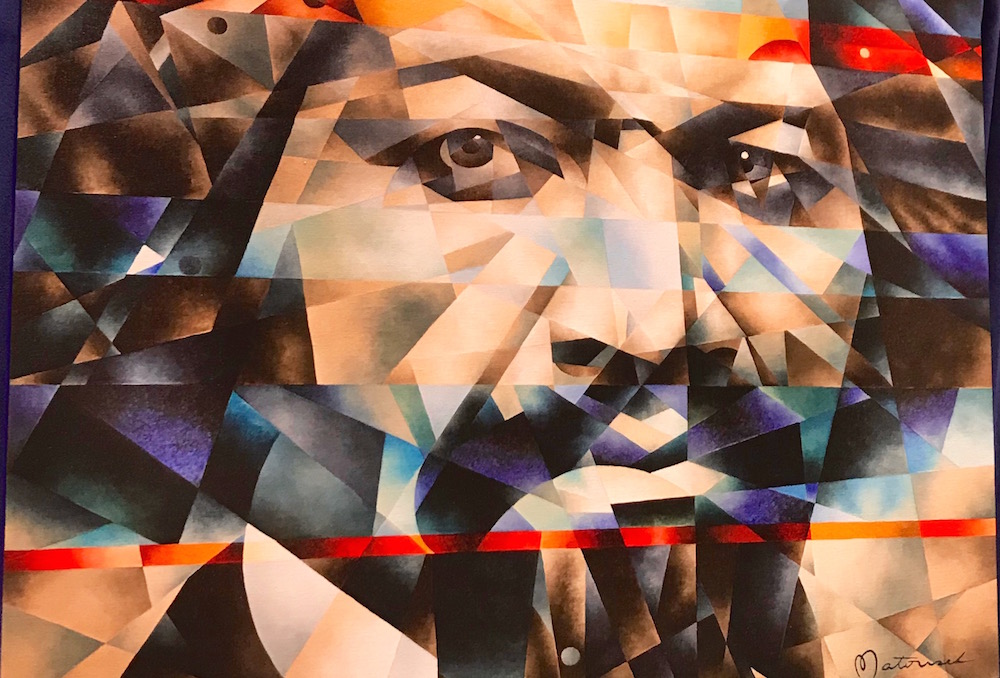
This spring inaugurated a year-long national celebration commemorating the bicentennial of the birth of the iconic American Frederick Douglass. Born to an enslaved black woman on a Maryland plantation in 1818, Douglass escaped bondage and became a force for justice on the strength of his reasoned moral clarity and impassioned eloquence.
Two centuries later, elected officials and community leaders are coming together to celebrate his enduring relevance. By a rare unanimous vote, Congress established the Frederick Douglass Bicentennial Commission to plan and carry out educational events to honor his life and legacy. A rising portrait artist has interpreted the iconic activist. And a major motion picture is in the works. Last week, The Heritage Foundation hosted scholars and activists who discussed the varied aspects of Frederick Douglass and what his ideas mean today.
A complex portrait emerged of one who loved his nation and agitated for change. As a newspaper editor, social reformer and adviser to President Lincoln, Douglass helped guide America through the turbulent Civil War. The conflict claimed more than 600,000 lives — nearly equal to the casualties of all other U.S. wars combined.
“The epic story of Frederick Douglass contains a lot of the arc of American history,” said Colin Hanna, executive producer of a forthcoming feature film about Douglass. “He is an heroic figure. Today, we hear that the ‘Black Panther’ movie represents the success of the first black superhero.”
“I would argue that America’s real first black superhero was Frederick Douglass.”
Feature Film to Celebrate His Life and Legacy
A longtime public policy advocate and veteran, Hanna founded Enduring Impact Productions two years ago to bring Douglass’ life story to the big screen.
“There is a tremendously receptive environment right now for people to become acquainted with Douglass,” said Hanna. “Most people know only a handful of fragments of his story. One of the best ways of educating a wide swath of Americans is through a theatrical release motion picture. So that’s what we’re doing.”
With contributions from several historical advisors, the team hired a Hollywood writer who had just completed a $50 million production. Similar to Douglass’ story, that film also addressed slavery during the Civil War era.
“Our principal screenwriter is Leonard Hartman, who wrote ‘The Free State of Jones’ starring Matthew McConaughey,” stated Hanna. “He has very specific, relevant experience. Leonard told me at one point, as he was researching the screenplay, he had 16 books by and about Frederick Douglass open on the floor of his office.”
After many drafts, a working screenplay was completed over the past month. They are now interviewing directors and actors, as well as raising an estimated $20 million to produce the film. “2019 is an ambitious release date, but we’ll never get it done if we don’t set ambitious targets,” noted Hanna. “It’s quite an undertaking.”
The Former Slave Whose Words Changed A Nation
An award-winning artist faced a similarly daunting task in interpreting Douglass. For years, artist Tom Matousek has come to know history by researching and painting portraits of important public figures. From Jackie Robinson to Winston Churchill to Saint Teresa of Avila, his unique style uses bold colors and geometric shapes to capture multifaceted personalities.
When the Douglass Leadership Institute asked him to paint their namesake, Matousek did not know at the time this would bring his work national attention. The artist recalled how the reformer inspires him, even from his early years.
“As a boy, Douglass was closed off from opportunity,” observed Matousek. “Then one door cracked open: the potential to read. He saw a sliver of light and thought, What’s in there? He opened that door, taking it upon himself to be all he could be.”

His wife Kris Matousek was involved in research for the portrait. She recounted a story from “Narrative of the Life of Frederick Douglass” illustrating his point. “Douglass was creative and resourceful,” she said. “Even when barred from learning, he found ways to teach himself to read. Following the brutal treatment at the plantation, he worked as a house slave in Baltimore.”
Where Douglass was enslaved, many local white families had less to eat than he did. “Douglass would bring bread with him when he went to run errands,” continued Matousek. “Getting to know young white boys, he would challenge them: I’ll bet I can read better than you. He would bring bread and trade it for reading lessons. They helped each other and there was mutual respect.”
Douglass was a rare exception to the conditions black Americans faced in the 19th century. Escaping from slavery, the self-taught orator and writer boldly called his nation to account with fiery anti-slavery speeches in northern U.S. cities.
In 1850, the Fugitive Slave Law essentially legalized the kidnapping of any black man, woman or child. “There was no protection by law for them anywhere in the United States,” said Peter Myers of the University of Wisconsin-Eau Claire at the Heritage event. The author and lecturer often dispels popular myths about Douglass.
He quoted Frederick Douglass’ now-iconic Fourth of July oration delivered in 1852. “There is not a nation on the earth guilty of practices, more shocking and bloody, than are the people of these United States at this very hour,” stated Douglass. “In glaring violation of justice … and in diabolical intent, this Fugitive Slave Law stands alone in the annals of tyrannical legislation.”
However, Douglass diverged with popular anti-slavery ideology, including with that of his early mentor William Lloyd Garrison, who believed the Constitution to be pro-slavery. “The destruction of slavery, according to Garrison, required the destruction of America,” said Myers. “It’s surprising how quickly and thoroughly Douglass came to reject [this] position.”
In that same 1852 speech, Douglass skillfully evaded these views and expressed support for American principles. “Take the Constitution according to its plain reading, and I defy the presentation of a single pro-slavery clause in it,” he stated. “On the other hand, it will be found to contain principles and purposes entirely hostile to the existence of slavery.”
Yet scholars noted confusion about America’s founding charter persists today.
His Grievances with America — and Gratitude
“Douglass knew how to balance the politics of grievance with the politics of gratitude,” stated Dr. Diana Schaub of Loyola University Maryland at the event.
She summed up his political philosophy. “His shorthand formula for what is demanded of government is ‘a fair field and no favor,’” said Schaub. “It means the establishment of equality before the law, which in turn means race-based injustices would need to be dismantled.”
Then as now, some contend the American founders offered no firm foundation to recognize equality and human dignity. Critics point to the Three-Fifths Compromise as proof of a pro-slavery Constitution. Repealed following the Civil War, a misreading of this clause continues to influence many Americans.
“People think that this was some commentary on black humanity, and it has nothing to do with that,” said Myers following the event. “The three-fifths compromise was mainly about apportionment and taxation. How will this population of people, those enslaved and disfranchised, be counted?” Regional power in the federal government is derived largely from how Congress, the electoral college and direct taxes are apportioned to each state.
While many assume the three-fifths clause means that a black person was worth 60 percent of a white person, Myers shows the flaws of this understanding. “The slaveholding side argued they should be counted as whole persons,” he continues. “The opposite side said, No, if you’re going to treat them like property, then you can’t have representation for property. So the most anti-slavery side wanted them to be counted as zero persons.”
The three-fifths clause was struck down by the 14th Amendment to the Constitution ratified in 1868, followed by the right to voted explicitly granted to black Americans with the 15th Amendment in 1870. During this era, Douglass persisted as a national prophet of justice and equality.
“Real patriotism means holding America’s feet to the fire of its noble principles,” said Schaub. “For Douglass, a holiday never means a holiday from scathing criticism of American failings. He warned Americans against persecuting any variety of the human family.”
It begs the question: how might he address current contentions of discrimination?
What Douglass Would Say to Activists Today
Reverend Dean Nelson, chairman of the Douglass Leadership Institute, recalled his own journey starting out as a “radical student activist” at Howard University.
“I think of Frederick Douglass from an activist standpoint, because that is what I consider myself,” began Nelson. “It’s important for a generation of activists, especially young people, to take a look at who he actually became. We can start in one place, and end up somewhere else. There is an evolution of Douglass.”
Leading a team inspired by Douglass’ legacy, Nelson has seen many attempt to coopt the 19th century statesman. He carefully translated the iconic agitator to current events. “Douglass might affirm and to a degree encourage the modern Black Lives Matter movement,” he offered. “But [BLM does not] line up with his philosophy.”
“Frederick Douglass was a person of profound faith,” continued Nelson. “The Black Lives Matter movement today actually does not embrace an idea that we should forgive those who have done wrong to us.” He summed up their view as: The more wrong you have done, the more we should be antagonistic towards you.
Other panelists emphasized where Douglass called for reforms in his own time. “Douglass was emphatic there be no favors, no special categories created, no race-based privileges and no exemptions from a uniform standard,” stated Diana Schaub.
“He also recommended some carefully chosen forms of reparative justice, especially the provisioning of public education,” she said. Regarding literacy as the path to liberation, Douglass would not brush aside current disparities in education funding and achievement. A recent national Pew Research study found 75 percent of blacks say lower quality schools are a major reason their families face barriers to success.
Community and Elected Leaders Unite for National Effort
As a member of the Frederick Douglass Bicentennial Commission, Nelson noted they plan to speak out on other current issues. “There is a desire to address human trafficking,” he said. “The idea is to create a new generation of abolitionists.”
Other appointed members of the Commission include historian David Anderson; Kay Coles James, president of The Heritage Foundation; Dr. Alveda King, pro-life activist and niece of Martin Luther King, Jr.; Ken Morris, Jr., president of the Frederick Douglass Family Initiatives and great-great-great grandson of Frederick Douglass; Delegate Eleanor Holmes Norton (D-DC); Star Parker, president of the Center for Urban Renewal and Education; and Sen. Tim Scott (R-SC).
Details of the Commission’s planned nationwide activities are expected soon. It’s striking how ideologically diverse these leaders are — reflecting Douglass’ aversion to political polarization. While continually advocating for policy reforms, he saw the perils in viewing the other side of debates with hostility and personal animus.
“Douglass focused on unity and the ideals of America — while admitting, too often, the nation falls short or baldly contradicts those ideals,” said Colin Hanna, hard at work on the Douglass feature film. “The ideals were right, while their implementation in American society was wrong.”
“Rather than us being separated along lines such as ethnicity or party, this message can bring America together.”









